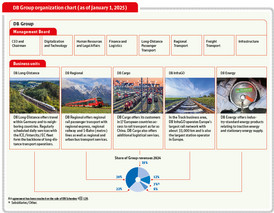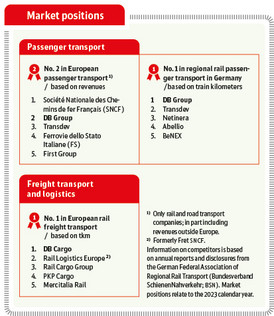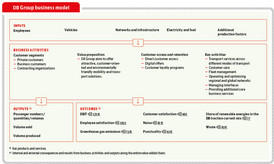DB Group
Organizational structure

DB AG is the parent company of DB Group. It has been a stock corporation under German law since it was founded in 1994 and accordingly has a dual management and control structure comprising a Management Board and a Supervisory Board. It is wholly owned by the Federal Republic of Germany. Changes in the composition of the Supervisory Board and Management Board are presented in the Supervisory Board report.
DB Group comprises passenger transport activities in Germany, rail freight transport activities, the operating service units and the rail infrastructure companies (RICs).
DB Group is a leading provider of passenger and freight transport. Our national and international services give us leading market positions in our relevant markets. With a length of about 33,000 km, we operate Europe’s longest rail network. We are also one of the largest energy suppliers in Germany.
There were significant changes to DB Group’s major international subsidiaries in 2024:
- The sale of DB Arriva was completed in May 2024.
- The sale of DB Schenker was decided in October 2024 and is expected to be implemented in 2025.
DB Group, headquartered in Berlin, employs about 226,000 people (excluding DB Schenker). DB AG manages all business units as an operating management holding company and supports the business units through various central Group functions (including legal, corporate development, balance sheets, taxes and insurance, as well as finance and treasury) and administrative service units. In addition, operational service units as legally independent subsidiaries of DB AG primarily provide services for intra-Group customers. These include DB Systel GmbH, DB Sicherheit GmbH, DB Services GmbH and DB Kommunikationstechnik GmbH.
Business model
The business model of DB Group will change as a result of the sale of DB Schenker. In future, we will be focusing our strategy on our core business: our passenger transport activities in Germany, our rail freight transport activities and the rail infrastructure companies. DB Group’s logistics activities, which are bundled at DB Schenker, are thus no longer described in the business model. The main effects that the completion of the planned sale of DB Schenker will have on DB Group are presented in the following chapters: green transformation, employees and business development.
Sustainability management
The topic of sustainability, with its aspects in the environmental, social and governance dimensions, has a high priority within DB Group. For this reason, for example, the importance of climate protection but also social issues such as employee satisfaction or the share of women in leadership are reflected in their anchoring in the Strong Rail strategy. Sustainability is also firmly incorporated in the variable remuneration of Management Board members, executives and other employee groups.
Responsibility for sustainability – and thus climate-related opportunities and risks is the responsibility of the Chief Sustainability Officer (CSO). The role is exercised by the Chairman of the Management Board (CEO) of DB AG. The CSO’s perspective is thus incorporated in a very central role in all important Group decisions. With regard to climate-related decisions, the CEO is also significantly involved in strategy development in his dual role. In 2024, the Management Board decided for example to adopt the Green Rail Technology program, a package of measures for additional climate protection, among other things, to improve energy efficiency. The CEO is also responsible for compliance issues. Responsibility for employee issues lies with the Management Board member for Human Resources and Legal Affairs and for occupational safety issues with the Management Board member for Digitalization and Technology.

